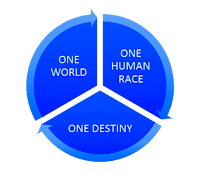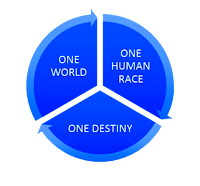CHILDHOOD'S CHALLENGES
Over the years, indeed, over the centuries, adults have decided what childhood should be about, including its duration and how children spend it. Childhood is, in many countries, influenced, if not determined by social, economic, cultural and political factors. This happens not only in the so-called less developed or developing countries, but also in the more technologically advanced ones, such as Britain, Europe and America.
Of course, it is not surprising that it is the adults who should, in the first instance, decide what childhood should be about, probably except with regards to the physiological and neurological aspects of it. Yes, childhood, it seems to me, has a number of tasks or challenges to complete.
I see these as including the role of childhood as a period to enable the child to accomplish his/her physiological and neurological development; at least as far as these tasks can be accomplished in ones childhood. For the child to be able to progress to health adulthood, he/she needs to be cared for properly, so that they develop a healthy physique and normal brain structure and function. In simpler terms, the child needs to be provided with an appropriate standard of care which promotes the development of a sound body and intellect. Where a child has a significant disability, then the challenge is to still to enable, as much as possible, that child to develop his/her potential to the maximum.

This focus on the development of a sound body and mind will lay the foundation for other challenges which the child is set throughout their childhood.
Another challenge which childhood should promote, is the child's acquisition of their people's cultural attributes and identity, which will enable the child to have a sense of belonging, and an initial world view, based on his/her people's cultural and social perceptions. This stage of the child's personal and social development will help the child to become 'acculturised', into their parental cultural and sociological norms, customs and values.
A third challenge for childhood, is the promotion of the child's intellectual capacity to acquire information and knowledge, and to learn from it and use it to maximise his/her intellectual development, throughout childhood and into adulthood. This challenge of learning and intellectual development, is, of course, probably the most important one for the child, since it is in the child that the future of his/her people/society is invested. For his/her people to survive, the adults into which the children will be transformed, must be able use the past and the present to predict the future, and innovate to meet the challenges which will be thrown at them.
Unfortunately, some cultures, to their people's detriment, remain an unchanging time vacuum, and actively/passively discourage attempts to promote their children's intellectual and social advancement. We can see this happening in tribalistic or feudal societies and Islamic countries, where the roles of male and female are rigidly differentiated, and might deny females from having an education or an education equal to that of males. Or it might place limits on intellectual advancement, by forbidding people from questioning and challenging religious orthodoxies, such a the existence of god and what it and is not allowed on an arbitrary religious basis.
The third challenge which childhood has to accomplish, is that of enabling the child to acquire and start to develop a set of knowledge, skills and attitudes which will help them to successfully assume adult roles, such as becoming a competent worker, member of a team, establishing a mutually beneficial and satisfactory intimate relationship, being a capable or good enough parent, being a leader, being a happy citizen and contributing towards the happiness of others, and so forth.
Yet a fourth challenge of childhood, is to have fun; lots and lots of fun and a prolonged stated of happiness, with the stresses of adulthood being kept out of their lives. Again, unfortunately, we adults - who would have believed that we, also, were once children and should have had a better handle on what children need to promote their happiness and wellbeing? - have seemingly lost the capacity to achieve happiness, as we scurry around in our quest to increase our acquisition of more and more material things. Indeed, even our children have, through our quest to protect them from anything and everything which could harm them, which, ironically, includes living, lost the ability to have fun with objects of their own creation, instead of manufactured toys, games, etc.

So, what conclusion have I come to? Probably this; that childhood, like political ideology, and like a country's response to 'human rights' issues, is not a value-free, or 'judgement-free' concept or practice. It is something which is inextricably bound up in world-view of each society, as it pertains to their culture, religious beliefs, economic activities and their politics.
As a finite concept, it is probably the case that, the more politically and economically advanced a society is, the more likely it is that it will have evolved a more compassionate and advanced concept and practice of childhood.








Comments